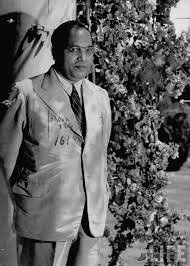Opposition to untouchability
Dr Bhimrao Ambedkar

Opposition to untouchability
As Ambedkar was educated by the Princely State of Baroda, he was bound to serve it. He was appointed as Military Secretary to the Gaikwad but had to quit within a short time. He described the incident in his autobiography, Waiting for a Visa. Thereafter he tried to find ways to make a living for his growing family. He worked as a private tutor, as an accountant, and established an investment consulting business, but it failed when his clients learned that he was an untouchable.In 1918 he became Professor of Political Economy in the Sydenham College of Commerce and Economics in Mumbai. Even though he was successful with the students, other professors objected to his sharing the same drinking water jug that they all used.Ambedkar had been invited to testify before the Southborough Committee, which was preparing the Government of India Act 1919. At this hearing, Ambedkar argued for creating separate electorates and reservations for untouchables and other religious communities.In 1920, he began the publication of the weekly Mooknayak (Leader of the Silent) in Mumbai with the help of Shahaji II (1874 1922), Maharaja of Kolhapur.
Ambedkar went on to work as a legal professional. In 1926 he successfully defended three non Brahmin leaders who had accused the Brahmin community of ruining India and were then subsequently sued for libel. Dhananjay Keer notes that The victory was resounding, both socially and individually, for the clients and the Doctor.
 Test your English Language
Test your English Language  Dog Breeds
Dog Breeds Benefits of Lime
Benefits of Lime Tips to succeed in Sales
Tips to succeed in Sales Celebration of Onam
Celebration of Onam Fashion Designer Cars in the world
Fashion Designer Cars in the world Tips to succeed in Presentation
Tips to succeed in Presentation Latest Sarees in bollywood
Latest Sarees in bollywood




